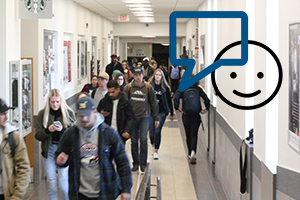
STM's Bell Let's Talk panel discussion offers students perspective on mental health issues
Resources available for students; frank discussion helps erase stigma
By Paul SinkewiczTaylor Spock offered up a very personal story about her own mental health journey during a recent online panel discussion.
Spock was able to speak from the perspective of a current STM student and as someone who has intimate experience dealing with mental health issues -- both with a family member and as a part of her own struggles.
“I found my education on mental health profoundly affected my capacity for empathy and understanding. It normalized mental health issues as being like a sprained ankle, and that it could happen to anyone,” Spock said.
The Bell Let’s Talk Day event was co-hosted by Healthy Campus Saskatchewan and the STM Peer Health Mentors on Wednesday, Jan. 26. It featured Spock, Dr. Gerry Farthing, from the STM Department of Psychology, and Fr. Andre Lalach, of STM Campus Ministry.
Makda Sengal, Student Outreach Coordinator at Healthy Campus Saskatchewan, said the goal of the event was to have a frank discussion about student mental health, and how it can affect students and what are some of the resources available to students dealing with mental health struggles.
Spock’s early family experiences focused her attention on the stigma around mental health struggles in society.
“I think one of the things that can be frustrating about mental health is the fact that it takes time. Not that it has to take forever, but perseverance is key in seeking a balanced mental health. Another key to a healthy mental state is recognizing and admitting when you aren’t feeling well. That’s way easier said than done. Even if you’re educated in mental health, it can still be hard to recognize or admit you have mental health issues when it concerns yourself.”
Spock said its often not well understood how difficult it is to recognize and admit a problem and then to seek help. She said it took her some time to realize she was masking her own struggles and said if she hadn’t finally sought and found help, she might not have succeeded in university.
“It doesn’t mean you are a failure if you are having problems with your mental health. That needs to be made clear. But I do understand the sentiment of personal failure when you do need to seek help for your mental health, it can feel like it’s easier to mask than to ask for help.”
Spock spoke about the tips and techniques she has found that help her deal with anxiety and be more productive, including frequent, short breaks, working exercise into her study routine, setting boundaries and building nutritious snacks into her diet.
She said the key to manage mental health struggles is admitting the problem, seeking help from the resources available to students and learning what works for you. Healthy mental health is achievable, but is a journey, not a switch that can be flipped.
The STM Peer Health mentors is an initiative of St. Thomas More College with the support of Healthy Campus Saskatchewan. All Peer Health mentors at STM are University of Saskatchewan student volunteers who are working with, and are under the supervision of, STM Campus Ministry.
Students can reach out to the STM Peer Health Mentor program by emailing peerhealth@stmcollege.ca or finding them on Instagram at stmpeerhealth.
STM Campus Ministry offers confidential listening, as well as spiritual and personal guidance to students, faculty, and staff of all backgrounds. To connect with STM Campus Ministry, visit the webpage at stmcollege.ca/campus-ministry
